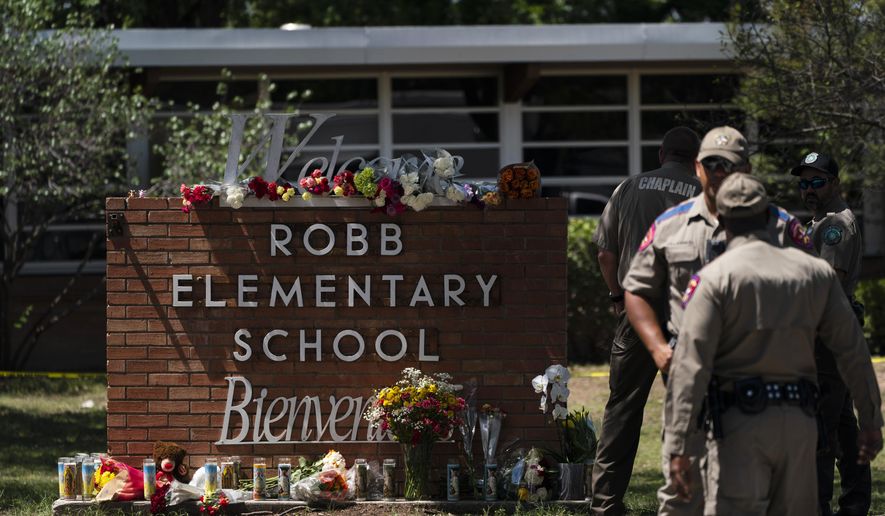Lawmakers in both parties are exploring a national “red flag” law and expanded background checks in the wake of the school shooting in Texas that killed at least 19 children and two teachers.
With tension and partisanship surrounding the issue on Capitol Hill, few lawmakers believe any legislation can get the 60 votes needed to overcome a filibuster within the evenly split Senate. But a cadre of moderate Republicans and Democrats are working in hopes of finding a compromise that can attract sufficient support to become law.
“I’m going to start having conversations again with colleagues on both sides of the aisle,” said Sen. Kyrsten Sinema, Arizona Democrat. “If there is a chance for us to do something to help make it safer for kids in this country, we owe it to the country to do it for real, not just talking points.”
Lawmakers hope that bipartisan consensus can form around expanding background checks for gun purchases and a national “red flag” law. The latter proposal would allow law enforcement to remove firearms from individuals determined by a court to be a danger to themselves and others.
Lawmakers hope that both proposals will be an easier sell to Republicans wary of primary challengers or crossing the gun lobby.
“There are a lot of solid things that will work and we need to look at those and basically get a piece of legislation,” said Sen. Joe Manchin III, West Virginia Democrat. “We know that we can show we can be united to protect our children. That’s the thing in a nutshell.”
SEE ALSO: Schumer admits gun-control push will fail, hopes for bipartisan compromise
Republican senators seem open to some sort of “red flag” legislation. Nineteen states, including Florida and Indiana, already have such laws on the books.
Republican Sen. Rick Scott, who as governor signed Florida’s “red flag” law, described it this way: “For people who threatened harm to themselves or somebody else, you could only go through law enforcement and you had to go through the courts and it wasn’t permanent.”
Lawmakers say such legislation, coupled with more funding for law enforcement and enhanced background checks, could prevent a mass shooting from taking place.
The push comes as a shooting earlier this week at Robb Elementary School in Uvalde, Texas, which saw at least 19 children and two teachers killed. Most of the victims were under the age of 11.
“We have Republicans and Democrats that have the same feelings I have. This is the most excruciating pain that [a family] could ever endure,” said Mr. Manchin. “If that doesn’t move you, nothing will.”
It remains to be seen whether this tragedy will propel legislation forward. Lawmakers are set to depart Washington for a week-long break starting on Thursday.
SEE ALSO: All shooting victims were in one classroom in Texas elementary school: police
There also remain significant differences among lawmakers on the issue. While most say Congress should act, few can agree on what that should entail.
GOP lawmakers say gun control is not the answer. Instead, they contend that mass shootings are part of a larger societal problem.
As such, Republicans argue that Congress should work to address mental health issues, while boosting resources and funding for law enforcement.
“I have an interest in grappling with what can be done. I really don’t think the answer is gun control,” said Sen. Roger Wicker, Mississippi Republican. “This happens in states with very, very severe gun control laws and it happens in states that have fewer restrictions.”
But focusing on mental health is not enough for some Democrats.
“Spare me the bull—— about mental illness,” said Sen. Chris Murphy, Connecticut Democrat. “We don’t have any more mental illness than any other country in the world.”
Progressive Democrats say that the only way to prevent mass shootings is to push through strict gun control, including a ban on assault weapons.
“No one in America needs an AR-15,” said Sen. Bernard Sanders, an independent and self-described socialist from Vermont. “How many more children, mothers and fathers need to be murdered in cold blood before the Senate has the guts to ban assault weapons and take on the [National Rifle Association]?”
Not all Democrats agree. Sen. Jon Tester of Montana said that discussing a ban on assault weapons was useless, especially since lawmakers were struggling to find support for something more bipartisan like expanded background checks.
“It’s not going to pass if you can’t get background checks,” said Mr. Tester. “Kids got killed yesterday, for Christ’s sake, let’s talk about what can be done, not about what somebody wants.”
• Haris Alic can be reached at halic@washingtontimes.com.




Please read our comment policy before commenting.